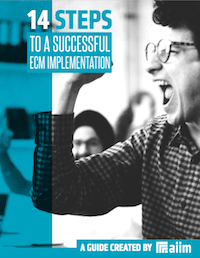The AIIM Blog
Keep your finger on the pulse of Intelligent Information Management with industry news, trends, and best practices.
How can Intelligent Document Recognition change the way you view business processes? The combination of pressure to reduce costs, comply with stringent regulations, and satisfy ever-increasing customer service demands is placing a big strain on operations and processes that rely on unstructured information such as documents, images and e-mails.
Share
Intelligent document recognition provides three key capabilities that transform unstructured information into the fuel that ignites better processes and insight:
Share

Making an ECM implementation successful requires planning and attention to detail. The best way to create the right solution is to identify organizational goals and priorities. Learn how to manage a successful implementation in our free guide.
Capture and Imaging | Information Security
A typical document imaging system is creating four major vulnerabilities that substantially increase the potential for data theft and violations of information management regulations: Not encrypting the data while it's in motion. Unsecured log files. Poor visibility into operator activities. Poor security management. New technology can help mitigate the above risks. I'm not here to sell you a system, I'm here to sell you an approach to a system. I'm telling you that if you're sitting on years old document scanning system, you're probably at risk, and it's time for you to look for a system. Get out your legal pad. Get out your pen and get ready to write down the four things I'm about to tell you to look for in a new document scanning system.
Share
Capture and Imaging | Information Security
Despite all of the investments you're making at the macro level, despite all the efforts that your IT department is doing on your behalf, there's a gap in your information security systems, and it is in the unlikeliest of places - your document scanning and data capture systems. Your information on-ramp is leaving you vulnerable to the bad guys. A typical document imaging system is creating four major vulnerabilities that substantially increase the potential for data theft and violations of information management regulations.
Share
Capture and Imaging | Information Security
Think your scanned images are safe? Think again! As we begin 2016, the biggest threat to your business probably isn't the proverbial competitor down the street. It's someone who wants to take advantage of your corporate information. We know that a growing number of businesses and government entities have already become cyber war victims.
Share
Capture and Imaging | Mobile | Paperless Office
The twin drivers for change in the Enterprise Content Management (ECM) world are mobile and cloud. Mobile technologies unlock access to content on the move, capture to cloud, capture to process, remote workflows, and cloud-based collaboration. But, with any change comes new challenges. There are still many issues to resolve between traditional back-office systems and new cloud and mobile solutions like hybrid options. How is mobile changing how you capture and create process-based content? Let's take a look at what the data is telling us:
Share